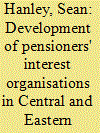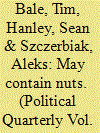| Srl | Item |
| 1 |
ID:
118428


|
|
|
|
|
| Publication |
2013.
|
| Summary/Abstract |
Studies of organised interests in Central and Eastern Europe have overlooked constituencies shaped by the welfare state such as retired people. The article compares the development, structure and strategies of pensioners' interest organisations in the Czech Republic and Slovenia. It finds that sizeable, if poorly resourced, membership-based pensioners' interest organisations have emerged, largely independently of trade unions, and integrated into interest representation systems. Although lack of resources and organisational problems hamper lobbying capacity, these groups retain mobilisation potential. Comparison suggests that legacies and modes of transition still shape pensioners' interest organisations more than institutional structures or new population ageing strategies.
|
|
|
|
|
|
|
|
|
|
|
|
|
|
|
|
| 2 |
ID:
095294


|
|
|
|
|
| Publication |
2010.
|
| Summary/Abstract |
The British Conservative Party's decision to leave the European Peoples' Party-European Democrats (EPP-ED) group in the European Parliament and establish a new formation-the European Conservatives and Reformists (ECR)-has attracted criticism, much of it focused on the supposedly extremist politics and character of the partners with which the Conservatives have chosen to work. In fact, while those parties which have joined the Conservatives in the new group are for the most part socially conservative, they are less extreme and more pragmatic than their media caricatures suggest. Moreover, such caricatures obscure some interesting incompatibilities within the new group as a whole and between some of its Central and East European members and the Conservatives, not least with regard to their foreign policy preoccupations and their by no means wholly hostile attitude to the European integration project.
|
|
|
|
|
|
|
|
|
|
|
|
|
|
|
|